财政学第一单元 概要 试题
财政学习试题库和答案与解析
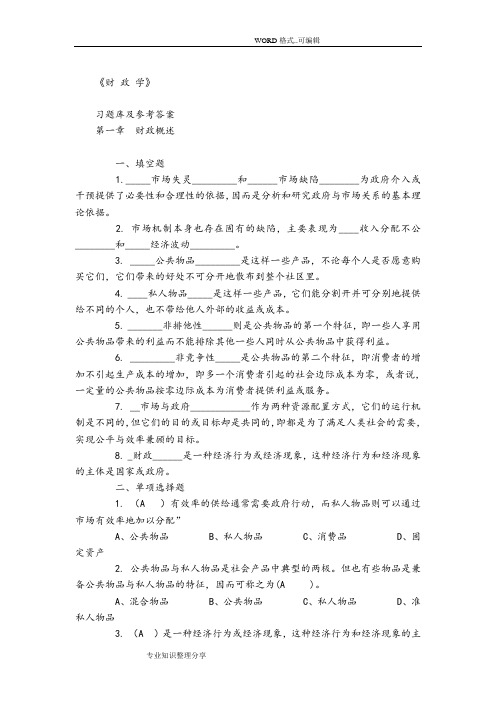
《财政学》习题库及参考答案第一章财政概述一、填空题1._____市场失灵_________和______市场缺陷________为政府介入或干预提供了必要性和合理性的依据,因而是分析和研究政府与市场关系的基本理论依据。
2. 市场机制本身也存在固有的缺陷,主要表现为____收入分配不公________和_____经济波动_________。
3. _____公共物品_________是这样一些产品,不论每个人是否愿意购买它们,它们带来的好处不可分开地散布到整个社区里。
4. ____私人物品_____是这样一些产品,它们能分割开并可分别地提供给不同的个人,也不带给他人外部的收益或成本。
5. _______非排他性______则是公共物品的第一个特征,即一些人享用公共物品带来的利益而不能排除其他一些人同时从公共物品中获得利益。
6. _________非竞争性_____是公共物品的第二个特征,即消费者的增加不引起生产成本的增加,即多一个消费者引起的社会边际成本为零,或者说,一定量的公共物品按零边际成本为消费者提供利益或服务。
7. __市场与政府____________作为两种资源配置方式,它们的运行机制是不同的,但它们的目的或目标却是共同的,即都是为了满足人类社会的需要,实现公平与效率兼顾的目标。
8. _财政______是一种经济行为或经济现象,这种经济行为和经济现象的主体是国家或政府。
二、单项选择题1. (A )有效率的供给通常需要政府行动,而私人物品则可以通过市场有效率地加以分配”A、公共物品B、私人物品C、消费品D、固定资产2. 公共物品与私人物品是社会产品中典型的两极。
但也有些物品是兼备公共物品与私人物品的特征,因而可称之为(A )。
A、混合物品B、公共物品C、私人物品D、准私人物品3. (A )是一种经济行为或经济现象,这种经济行为和经济现象的主体是国家或政府。
A、财政B、税收C、货币政策D、国际贸易4. (D )是公共物品的第一个特征,即一些人享用公共物品带来的利益而不能排除其他一些人同时从公共物品中获得利益。
财政学练习题,附答案
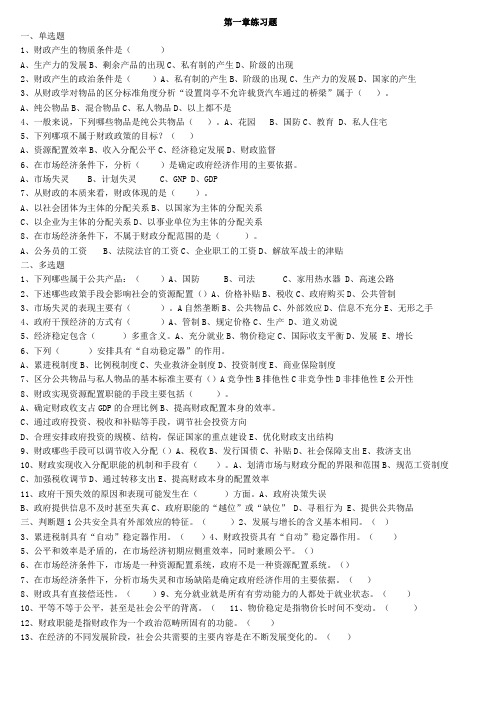
第一章练习题一、单选题1、财政产生的物质条件是()A、生产力的发展B、剩余产品的出现C、私有制的产生D、阶级的出现2、财政产生的政治条件是()A、私有制的产生B、阶级的出现C、生产力的发展D、国家的产生3、从财政学对物品的区分标准角度分析“设置岗亭不允许载货汽车通过的桥梁”属于()。
A、纯公物品B、混合物品C、私人物品D、以上都不是4、一般来说,下列哪些物品是纯公共物品()。
A、花园B、国防C、教育 D、私人住宅5、下列哪项不属于财政政策的目标?()A、资源配置效率B、收入分配公平C、经济稳定发展D、财政监督6、在市场经济条件下,分析()是确定政府经济作用的主要依据。
A、市场失灵B、计划失灵C、GNPD、GDP7、从财政的本质来看,财政体现的是()。
A、以社会团体为主体的分配关系B、以国家为主体的分配关系C、以企业为主体的分配关系D、以事业单位为主体的分配关系8、在市场经济条件下,不属于财政分配范围的是()。
A、公务员的工资B、法院法官的工资C、企业职工的工资D、解放军战士的津贴二、多选题1、下列哪些属于公共产品:()A、国防B、司法C、家用热水器 D、高速公路2、下述哪些政策手段会影响社会的资源配置()A、价格补贴B、税收C、政府购买D、公共管制3、市场失灵的表现主要有()。
A自然垄断B、公共物品C、外部效应D、信息不充分E、无形之手4、政府干预经济的方式有()A、管制B、规定价格C、生产 D、道义劝说5、经济稳定包含()多重含义。
A、充分就业B、物价稳定C、国际收支平衡D、发展 E、增长6、下列()安排具有“自动稳定器”的作用。
A、累进税制度B、比例税制度C、失业救济金制度D、投资制度E、商业保险制度7、区分公共物品与私人物品的基本标准主要有()A竞争性B排他性C非竞争性D非排他性E公开性8、财政实现资源配置职能的手段主要包括()。
A、确定财政收支占GDP的合理比例B、提高财政配置本身的效率。
《财政学》练习题(1-6章)(含答案)

《财政学》练习题(1-6章)(含答案)《财政学》第一至六章练习题一、单选题1.财政产生的物质条件是( B )A、生产力的发展B、剩余产品的出现C、私有制的产生D、阶级的出现2.财政产生的政治条件是( D )A、私有制的产生B、阶级的出现C、生产力的发展D、国家的产生3.一般来说,下列哪些物品是纯公共物品( B )。
A、花园B、国防C、教育D、私人住宅4.下列哪项不属于财政政策的目标?( D )A、资源配置效率B、收入分配公平C、经济稳定发展D、财政监督5.在市场经济条件下,分析(A )是确定政府经济作用的主要依据。
A、市场失灵B、计划失灵C、GNPD、GDP6.从财政的本质来看,财政体现的是( B )。
A、以社会团体为主体的分配关系B、以国家为主体的分配关系C、以企业为主体的分配关系D、以事业单位为主体的分配关系7.在市场经济条件下,不属于财政分配范围的是( C )。
A、公务员的工资B、法院法官的工资C、企业职工的工资D、解放军战士的津贴8.若按社会中产品的价值构成来分类,以下各项支出中属于补偿性支出的是( B )。
A.基本建设支出 B.挖潜改造资金支出C.科技三项费用支出 D.价格补贴支出9.按国家职能分类,所占数额最大的是(A )。
A经济建设支出 B投资性支出C行政管理费支出 D积累性支出10.直接影响收入分配,间接影响生产和就业的支出是( D )A积累性支出 B消费性支出 C购买性支出 D转移性支出11.以下各项指标更能反映财政活动规模实际状况的指标是( A )。
A.财政支出占GDP的比重 B.财政收入占GDP的比重C.税收收入占GDP的比重 D. 财政投资占GDP的比重12.影响财政支出规模的重要因素是( A )。
A.经济发展水平 B.政治性因素 C.社会性因素 D.经济政策13.尽管政府采购的数额巨大,但它也只是( B )的一部分。
A.财政收入B.财政支出C.财政补贴D.财政透支14.政府采购中最能体现公开原则的采购方式是( B )A.询价 B.招标 C.协商 D.谈判15.下列项目属于社会消费性支出的是( B )A.财政部对于西部大开发的资金支持B.国防科工委对于两文卫星测控中心某项新技术发明的资金拨款C.国家对东南亚海啸灾害的捐款。
财政知识学知识题及答案解析
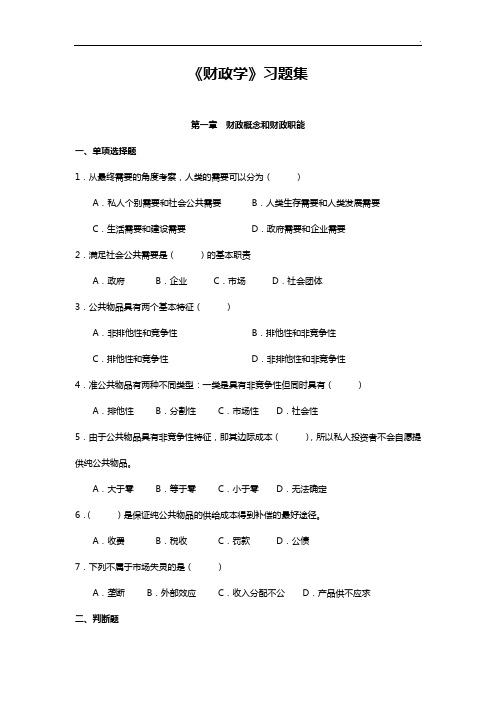
《财政学》习题集第一章财政概念和财政职能一、单项选择题1.从最终需要的角度考察,人类的需要可以分为()A.私人个别需要和社会公共需要B.人类生存需要和人类发展需要C.生活需要和建设需要D.政府需要和企业需要2.满足社会公共需要是()的基本职责A.政府B.企业C.市场D.社会团体3.公共物品具有两个基本特征()A.非排他性和竞争性B.排他性和非竞争性C.排他性和竞争性D.非排他性和非竞争性4.准公共物品有两种不同类型:一类是具有非竞争性但同时具有()A.排他性B.分割性C.市场性D.社会性5.由于公共物品具有非竞争性特征,即其边际成本(),所以私人投资者不会自愿提供纯公共物品。
A.大于零B.等于零C.小于零D.无法确定6.()是保证纯公共物品的供给成本得到补偿的最好途径。
A.收费B.税收C.罚款D.公债7.下列不属于市场失灵的是()A.垄断B.外部效应C.收入分配不公D.产品供不应求二、判断题1.社会的公共需要是是指全社会私人个别需要的数量集合。
2.公共物品的两个基本特征是非排他性和竞争性。
3.市场可以满足人们的一切需要。
4.在市场经济中,政府应该通过市场机制来满足社会公共需要。
5.社会公共需要无法通过市场满足,必须由政府部门通过财政来满足。
6.社会成员享用为满足社会公共需要而提供的公共物品,也必须与之等价交换。
7.非排他性是指一些人在享用公共物品带来的利益的时候,不能排除其他人同时从公共物品中获得利益。
8.非竞争性是指消费者的增加必然会引起生产成本的增加。
9.一般来说,纯公共物品只能由政府来提供而不能由市场来提供。
10.公共物品的享用和私人物品一样也可以分割和量化。
11.市场在资源配置中起基础性作用,是指所有资源都可以通过市场来配置。
12.经济学里所谓的“免费搭车”现象,是指消费者都不愿花钱购买公共物品,而是期望别人去购买,自己可以从中受益。
三、名词解释1.外部效应2.公共物品3.公共需要4.非排他性5.非竞争性6.资源配置7.财政四、简答题1.试述社会公共需要的特征。
财政学第一章政府、市场与公共财政练习题及答案
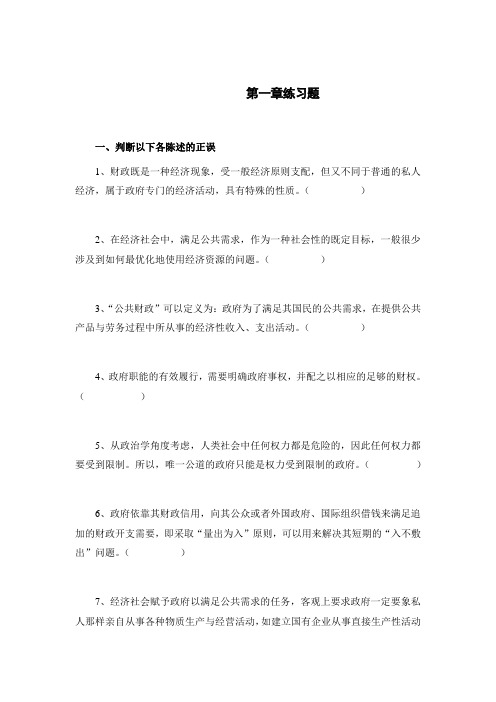
第一章练习题一、判断以下各陈述的正误1、财政既是一种经济现象,受一般经济原则支配,但又不同于普通的私人经济,属于政府专门的经济活动,具有特殊的性质。
()2、在经济社会中,满足公共需求,作为一种社会性的既定目标,一般很少涉及到如何最优化地使用经济资源的问题。
()3、“公共财政”可以定义为:政府为了满足其国民的公共需求,在提供公共产品与劳务过程中所从事的经济性收入、支出活动。
()4、政府职能的有效履行,需要明确政府事权,并配之以相应的足够的财权。
()5、从政治学角度考虑,人类社会中任何权力都是危险的,因此任何权力都要受到限制。
所以,唯一公道的政府只能是权力受到限制的政府。
()6、政府依靠其财政信用,向其公众或者外国政府、国际组织借钱来满足追加的财政开支需要,即采取“量出为入”原则,可以用来解决其短期的“入不敷出”问题。
()7、经济社会赋予政府以满足公共需求的任务,客观上要求政府一定要象私人那样亲自从事各种物质生产与经营活动,如建立国有企业从事直接生产性活动等。
()8、政府财政活动必须根据法律、法规的要求,在一套严格的制度约束(如预、决算程序)和规范监督下有序地进行。
()9、政治行为广泛参与财政过程,有助于使政府官员较好地平衡社会整体利益与各种局部利益的关系。
当然,政治行为广泛参与财政过程也会对社会经济发展产生负面影响,如政府财政开支被疏导到某些滥用权力的政治家所代表的利益集团手中。
()10、政府财政的本质就是集中提供经济社会不可或缺的公共产品以满足经济社会不断增长、变化的公共需求。
()二、选择题(从以下各题所给答案中挑选出所有被认为是正确的答案)1、现代政府一般要在社会经济生活里发挥()职能。
A、保卫国家安全B、维护国内经济秩序C、提供基础设施D、提供社会保障2、政府的财政活动在诸多方面不同于私人经济活动,政府财政活动具有如下一些的基本特征,即()。
A、不以直接提供满足私人消费的物质产品为目的B、受国际惯例制约C、可以长期使用比较灵活的理财原则D、要在特定的法规框架下进行E、通常受政府主管官员的个人风格影响F、与特定政治过程相结合3、虽然在不同政治体制、经济体制的国家,政府事权、财权的规模,以及制衡方式、程度均有很大差别,但是人们普遍认识到,无论何种国家、何种条件下,政府的权限越大,()。
财政学各章题目

财政学各章题目第一篇:财政学各章题目第一章名词:公共物品非排他性非竞争性公共生产特许经营公共定价简答:1.政府失灵的表现和原因 2.市场失灵的表现及其矫正方式 3.公共提供和公共生产的区别与联系4.简述公共选择的机制论述:财政的三大职能及其实现途径第二章:公共生产公共定价特许经营1.简述4种关于财政支出规模发展变化的理论。
2.论述:财政支出是否在经济上直接获得等价补偿为标准可以分成几类?有什么经济分析意义?3.计算2010年中国财政支出的绝对规模和相对规模、财政支出增长率、财政支出增长弹性系数、财政支出增长边际倾向。
第三章:财政投融资1.简述几种主要的项目融资方式。
2.分析政府财政教育支出的理论依据和目前存在的问题第四章财政补贴税式支出1.试述市场经济条件1.简述预算外资金和非税收入的区别与联系。
2.简述影响财政收入规模的基本因素。
3.计算2010年中国财政收入的绝对规模和相对规模、财政支出增长率、财政支出增长弹性系数、财政支出增长边际倾向。
下建立社会保障制度的经济意义。
2.简述税收支出的形式。
第五章.简述预算外资金和非税收入的区别与联系。
2.简述影响财政收入规模的基本因素。
3.计算2010年中国财政收入的绝对规模和相对规模、财政支出增长率、财政支出增长弹性系数、财政支出增长边际倾向。
第六章1.税负转嫁规律。
2.简述马斯顿的经验分析原理并阐述低税率促进经济增长的机制。
3.简述最适课税理论的主要贡献。
4.论述税收与经济稳定的基本原理。
作图分析题:1.作图分析税收的超额负担。
2.作图分析税收对投资的影响。
要求:作图;分析影响。
3.作图分析拉弗曲线的经济含义。
第九章政府预算绩效预算政府采购预算管理体制1.中央与地方各级政府责任及财权划分的理论依据。
2.中央与地方各级政府责任及财权划分的模式。
3.简述分税制改革的主要及近年来完善内容。
第十章结构性赤字周期性赤字1.简述当总需求大于总供给时,政府财税调节的三种途径。
2024年财政学题库答案

一、单项选择题1.下列属于财政现象的是( C )。
企业引进外资B.企业发行股票 C.企业购置公债 D.企业购置金融债券2.财政学的研究对象( C )。
A个人B.企业 C. 政府 D.社会公益组织3.下列不属于财政现象的是( )。
A,营业税改增值税在全国履行B,财政部在香港分两次发行共280亿元人民币国债C.中国国防预算增加10% D.5月中国人民银行决定下调金融机构人民币存贷款基准利率4.供应学派的拉弗曲线阐明( B)A物价稳定的重要性B.减税重要性 C利率稳定的重要性 D.维持自由的重要性5.当代财政学之父是( D ) A凯恩斯B.哈耶克 C.费里德曼D.亚当.斯密6.下列分析属于规范研究()A.我国财政支出预算是171500亿元 B. 中央财政赤字为11200亿元,赤字百分比低C. 我国教育经费占GDP比重初次超出4% D. 全国一般公共预算收入154300亿元,增加7.3%7A.我国财政赤字16200亿元,赤字水平不高。
B.我国实行积极财政政策效果明显,要继续实行并适当加大力度。
C.我国宏观税负合理不存在税负过重问题。
D.我国一般公共预算收入154300亿元,增加7.3%。
8.市场失灵的体现不包括( C ) A、无法提供公共品 B、不能处理外部性 C、价格由供求决定D、信息不完全9.财政伴随(B)出现而产生A.人类B.国家 C.社会主义 D.资本主义10. 亚当.斯密主张政府的职责是(D )A.保持货币供应量稳定 B.保障公民自由 C.依法治国 D.“守夜人”提供国防、司法、便利社会商业等基本服务11.凯恩斯主张政府应当( )A.保持货币供应量稳定 B.保障公民自由 C.积极通过扩大政府投资等积极干预经济 D.“守夜人”提供国防、司法、便利社会商业等基本服务二、多项选择题1.财政的职能是( ABD )A资源配备 B.收入分派 C. 稳定物价 D.稳定经济2. A. 不能提供公共品B.不能处理外部性C.竞争失灵出现垄断D. 收入分派不公E.宏观经济失调3.财政怎样履行资源职能(ACD )A. 提供公共品B.对高收入人群征税调整收入差距C.矫正外部性 D.维护市场有效竞争4.财政怎样履行收入分派职能( ACD)A. 维护市场有效竞争B.处理外部性C.通过超额累进的所得税,对高收入人群征收高额税收 D. 对低收入人群提供最低生活保障5.国际公认的宏观经济稳定的目标(ABCD )A. 充足就业B.稳定物价C.经济增加D. 国际收支平衡E.人民幸福6.财政研究范围包括(ABCDE )A.中央政府B.省级政府 C.市级政府 D. 县级政府 E.乡级政府三、判断题1.财政是在资本主义国家才出现的。
(完整word版)陈共财政学1-10章的习题及答案
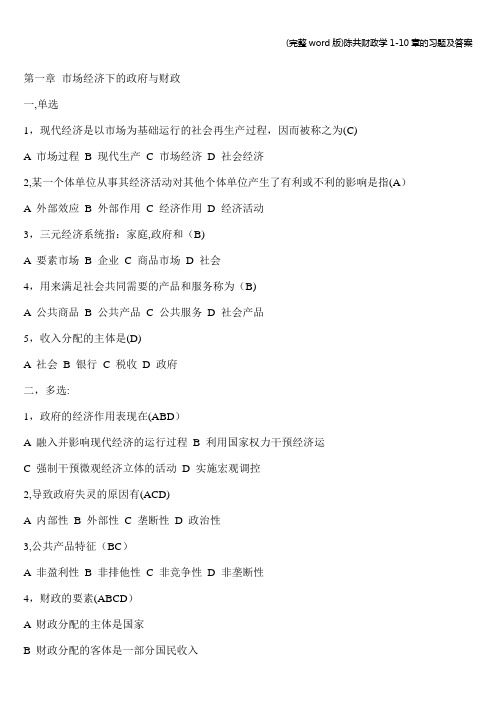
第一章市场经济下的政府与财政一,单选1,现代经济是以市场为基础运行的社会再生产过程,因而被称之为(C)A 市场过程B 现代生产C 市场经济D 社会经济2,某一个体单位从事其经济活动对其他个体单位产生了有利或不利的影响是指(A)A 外部效应B 外部作用C 经济作用D 经济活动3,三元经济系统指:家庭,政府和(B)A 要素市场B 企业C 商品市场D 社会4,用来满足社会共同需要的产品和服务称为(B)A 公共商品B 公共产品C 公共服务D 社会产品5,收入分配的主体是(D)A 社会B 银行C 税收D 政府二,多选:1,政府的经济作用表现在(ABD)A 融入并影响现代经济的运行过程B 利用国家权力干预经济运C 强制干预微观经济立体的活动D 实施宏观调控2,导致政府失灵的原因有(ACD)A 内部性B 外部性C 垄断性D 政治性3,公共产品特征(BC)A 非盈利性B 非排他性C 非竞争性D 非垄断性4,财政的要素(ABCD)A 财政分配的主体是国家B 财政分配的客体是一部分国民收入C 财政分配形式是实物形式,力役形式,价值形式D 财政分配的目的是满足国家实现其职能的需要5,公共财政的特征(ABCD)A 公共性B 非盈利性C 法治性D 民主性6,完全竞争市场的条件是(ABCD)A 在市场上有众多的买者和卖者B 各种资源都能够自由地通过市场转移C 生产者和消费者具有完全信息D 生产者所提供的同种产品是同质的第二章财政职能一,单选题1,财政职能以政府与(B)的关系为基本立足点。
A 居民B 市场C 社会D 税收2,判断资源配置优劣的标准是(C)A 福利最大化B 利润最大化C 帕累托最优D GDP最大化3,可就业人口的就业率达到了一个很高的比例是指(D)A 低失业B 高就业C 消灭失业D 充分就业4,提高财政配置工具的使用效率主要方法是(C)A 降低政府开支B 提高经济建设资金C 降低税收成本D 加快资金循环二,多选题1,市场失灵可以分为(ABC)A 市场在资源配置方面的失灵B 市场在收入分配方面的失灵C 市场在监督方面的失灵D 市场在宏观方面的失灵2,国民收入分配包括两个基本的层次(BC)A 工资分配B 初始分配C 再分配D 福利分配3,经济增长用(ABCD)衡量A GNPB GDPC 人均GNP水平D 人均GDP水平4,经济活动的两个准则是(CD)A 赢利准则B 守法准则C 公平准则D 效率准则5,在正确认识和处理收入差距与效率关系时,应注意(AB)A 收入差距的扩大应建立在要素分配的基础上B 收入差距要适度C 共同富裕D 允许非法暴富6,经济稳定包括(ABD)A充分就业B 物价稳定C 经济持续增长D 国际收支平衡7,国际收支逆差导致(AC)A 该国外汇储备减少B 该国外汇储备增加C 本国货币对外币汇率下降D 本国货币对外币汇率上升第三章财政支出结构与规模一,单选:1,政府从个人和企业购买原材料和土地,劳动力,资本的生产性服务并由政府直接使用的支出称为(A)A 购买性支出B 转移性支出C 生产支出D 基础支出2,政府在公民之间再分配购买力的支出称为(C)A 分配支出B 福利支出C 转移性支出D 购买力支出3,社会性支出占财政支出的比重随着经济发展阶段的上升而快速(D)A 不变B 减少C 不确定D 递增二,多选1,根据马克思的社会再生产理论从静态角度将财政支出划分为(ACD)A 补偿性支出B 投资性支出C 消费性支出D 积累性支出2,按国家职能将财政支出分为(ABCD)A 经济建设费B 国防费C 社会文教费D 行政管理费3,财政支出按国家职能分类的意义在于(ABCD)A 能够了解国家执行了怎样一些职能B 能够了解国家侧重了哪些职能C 对一个国家的支出结构纵向分析,可知道该国的职能的演变D 对若干国家的支出结构横向分析,可揭示各国职能的差别4,财政支出分析的主题大致可分为(ABC)A 结构分析B 总量分析C 效益分析D资金分析5,公共支出的性质可划分为(CD)A 预防性支出B 创造性支出C 消耗性支出D 转移性支出6,财政支出的国际分类方法(CD)A 经济分类B 国际分类C 理论分类D 统计分类7,置换效应包括对以前的(AB)的置换A 财政支出水平B 私人部门支出C 国防支出D 教育支出8,影响财政支出规模的因素(ACD)A 经济性因素B 环境性因素C 政治性因素D 社会性因素第四章财政支出效应分析一,单选:1,人们在有目的的实践活动中"所得”与”所费"的对比关系是指(C)A 效用B 利益C 效益D 得失2,政府项目使用的直接投入物的成本(A)A 直接成本B直接费用C 间接成本D 直接消耗3,政府项目所导致的产出增加或生产率提高并由该项目产品的直接使用者享有的效益是指(D)A 直接利益B 直接收益C 间接利润D 直接效益4,最常用的成本——效益分析决策标准是(A)A 净现值标准B 成本最小化C 利润最大化D 配置最优二,多选1,下列表述正确的是(ABCD)A 考虑资源在公私部门的配置采用机会成本分析法B 一些支出项目如电站投资,其效益是经济的,可以采用成本--效益法C 一些支出项目如军事,成本易于计算,效益不易衡量,采用最低费用选择法D 一些支出项目如公路邮电,成本易于衡量,效益不易计算,通过这些支出所提供的商品或劳务可以部分或全部进入市场交易,可采用”公共定价法"2,政府项目目标的确定要考虑哪些因素(ABD)A 众多目标的选择B 目标实现的时间转移C 外部效益干扰对目标的判断D 目标之间发生的冲突3,市场价格不能反映其成本的原因(ABCD)A 垄断存在B 税收因素C 资源处于闲置状态D 经济发展劳动力过剩4,选择决策标准主要有(ACD)A 内部收益率标准B 外部收益率标准C 净现值标准D 收益-—成本比率标准5,最低费用选择法的特点(CD)A 以社会福利最大化为目标B 多项严格假定C 只计算每项备选项目的有形成本D 不用货币单位来计量备选的财政支出项目的社会效益6,从定价政策来看,公共定价包括(AB)A 纯公共定价B管制定价C 厂商定价D 地方政府定价7,政府采购的特点(ABCD)A 资金来源的公共性B 资金用途的非营利性C 采购活动的政策性D 采购制度的规范性8,政府的采购行为必须遵循原则是(ABCD)]A 竞争原则B 公开原则C使用商业标准原则D透明原则9,政府采购范围从采购对象的性质角度可分为(BCD)A 武器B 货物C 服务D 工程10,政府采购模式可分为(ACD)A 集中采购模式B 自由采购模式C 分散采购模式D 集中和分散相结合11,政府采购合同的类型有(AB)A 固定费用合同B 成本加比例费用合同C 固定费用加比例费用合同D 固定费用加激励费用合同第五章购买性支出一,单选1,财政用于国家各级权力机关,行政管理机关,司法检察机关和外事机构行使其职能所需的费用支出指(C)A 政府指出B 非生产支出C 行政管理支出D财政支出2,财政用于文化,教育,科学,卫生等事业单位的经费支出指(B)A 教育支出B 文教科卫支出C 文化支出D 政府指出3,用于国防建设和人民解放军方面的费用指(B)A 军事支出B 国防支出C 政府指出D 财政支出二,多选1,下列对社会消费性支出表述正确的是(BC)A 社会消费性支出是生产性消费支出B 社会消费性支出是社会再生产正常运转所必须C 社会消费性支出本质是满足纯社会共同需要D 社会消费性支出是转移性支出2,我国行政管理支出包括(ABD)A公法检支出B 国家安全支出C 国防支出D 行政支出3,行政管理支出增长率很快的主要原因(AB)A 行政人员数量增加B 行政人员报酬提高C 行政业务费增加D 行政修缮费,设备购置费提高4,直接影响行政管理规模的因素是(ABCD)A 经济总体增长水平B 财政支出规模C 政府机构的设置D 行政管理支出本身的效率5,安排投资规模应注意(ABD)问题A 投资规模适度B 投资结构合理C 注重投资竞争性D 注重投资效益6,与政府投资相比,非政府投资具有怎样的特点(ABCD)A 营利性B 短期效应C 自身积累社会筹资D 忽略社会效益7,影响政府投资在社会总投资中所占比重的因素主要有(BC)A 政治制度差异B 社会经济制度的差异C 经济发展阶段的差异D 文化差异第六章转移性支出一,单选1,国家和社会依据一定的法律和规定,通过国民收入的再分配,对社会成员的基本生活权利予以保障的一项重大社会政策是指(B)A 国家再分配B 社会保障C 社会福利D 国家保障2,社会保障的实施主体是(A)A 国家B 社会C 企业D 家庭二,多选1,下列哪些属于转移性支出(AC)A 社会保障支出B 科学教育文化卫生支出C 税式支出D 国防支出2,社会保障支出的特征(ABCD)A 覆盖面的社会广泛性B 参与上的强制性C 制度上的立法性D 受益程度的约束性3,社会保障体系框架主要构成是(ABCD)A 社会保险B 社会福利C 社会救助D 社会优抚和安置4,财政补贴的内容从补贴同社会经济运行过程的关系来看,可分为(BCD)A 生产环节补贴B 流通环节补贴C 消费环节补贴D 分配补贴5,财政补贴的形式有(BD)A 货币补贴B 实物补贴C 国家补贴D 社会补贴6,下列关于财政补贴表述正确的是(BCD)A 财政补贴与社会保障支出一样与价格直接相关B 财政补贴可以纠正不合理的价格结构和纠正市场缺位C 财政补贴是各国运用调节经济的手段D 我国的财政补贴主要是价格补贴7,下列表述正确的是(CD)A 由于税式支出是一种隐蔽型财政补贴支出,因此税式支出不可估B 税收抵免是指是指准许企业把一些合乎规定的特殊支出,以一定的比率或全部从应税所得中扣除,以减轻其税收负担.在累进税制下,纳税人的所得越高,这种抵免的实际价值就越大.C 加速折旧使税负前轻后重,使政府损失了一部分收入的"时间价值"D 照顾性税式支出在于扶持国家希望发展的亏损或微利企业以及外贸企业第七章财政收入结构与规模一,单选1,财政分配的对象都是社会产品中剩余产品或与其对应的(C)A 产值B 利润C 价值D 收益2,政府以国家信用为依托取得的财政收入是(B)A 存款B 公债C 税收D 罚款二,多选1,关于财政收入表述正确的是(BD)A 财政分配的对象是社会产品B 我国现阶段财政收入形式由税收,国有资产收益,国债和其它收入构成C 专项收费是指国家机关为居民或各类组织机构提供某些特殊服务时所收取的手续费和工本费D 在许多国家,财政收入的90%以上要靠税收来保证,以至于可以近似地用税收收入的分析来观察整个财政收入的状况。
《财政学》习题、答案.docx

《财政学》习题、答案.docx第一章财政概念和财政职能思考题1、学习财政学为什么要从政府与市场的关系说起?2、什么是市场失灵?3、为什么会岀现政府干预失效?4、区分公共物品与私人物品的基本标准,并说明公共商品的特征。
5、如何理解财政的特姝性?6、研究财政职能的基本思路。
自测题一、选择题1、下列属于混合商品的是()oA 、法律法规B 、教育C 、行政管理D 、社会保障E 、货币发行2、经济稳定的关键在于()。
A 、充分就业B 、物价稳定C 、社会总供给和总需求的均衡D 、国际收支平衡 3、政府干预失效的原因和表现可能发生在()A 、政府决策失误B 、政府提供信息不及时甚至失真C 、政府职能的“越位”和“缺位”D 、寻租行为 4、基尼系数在()时收入分配的差距是合理的。
5、经济学家用來说明收入状况的图形是()oA 、洛沦兹曲线B 、拉弗曲线C 、生产可能性曲线6、财政的基本职能是()。
A 、资源配置职能B 、调节收入分配职能C 、组织生产和销售职能D 、经济稳定与发展职能7、完整的市场体系是哪儿个相对独立的主体组成的()A 、家庭B 、金业C 、政府D 、中介 8、政府干预手段包括:()A 、立法和行政手段B 、组织公共生产和提供公共物品C 、财政手段D 、强制手段9、一般来说,下列哪些物品是纯公共物品()A 、国防B 、花园C 、教育D 、桥梁10、公共筒品的基本特征是()。
A 、生产或提供的不可分性B 、非竞争性C 、规模效益较人D 、非排他性E 、具有自然垄断性二、判断题1、外部效应的不可分割性是公共物品的重要特征之一。
()2、教育是一种典型的混合物品。
()3、公共商品最重要的标志是消费的非排他性。
()4、企业垄断会获得额外利润,因而不会损失市场效率。
()A 、0.2B 、 0.3C 、0. 3?0.4D 、 0.4 D 、无差界曲线5、财政保持经济稳定增长的棊本手段是财政政策。
()6、税收是政府调节收入分配的唯-手段。
财政学最全习题第一章复习思考题及答案
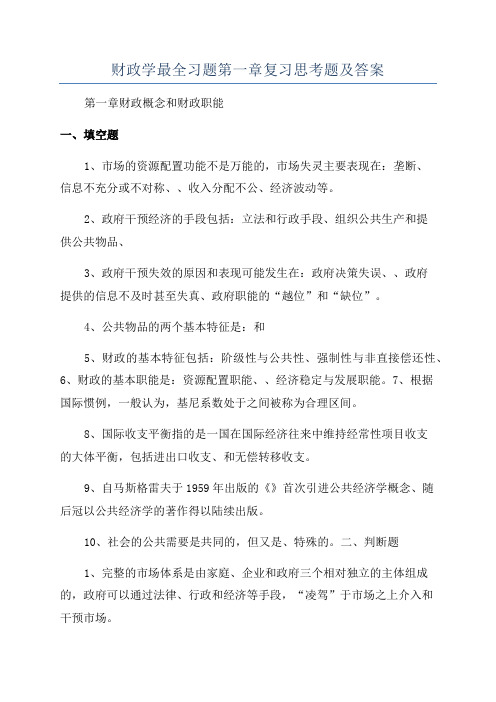
财政学最全习题第一章复习思考题及答案第一章财政概念和财政职能一、填空题1、市场的资源配置功能不是万能的,市场失灵主要表现在:垄断、信息不充分或不对称、、收入分配不公、经济波动等。
2、政府干预经济的手段包括:立法和行政手段、组织公共生产和提供公共物品、3、政府干预失效的原因和表现可能发生在:政府决策失误、、政府提供的信息不及时甚至失真、政府职能的“越位”和“缺位”。
4、公共物品的两个基本特征是:和5、财政的基本特征包括:阶级性与公共性、强制性与非直接偿还性、6、财政的基本职能是:资源配置职能、、经济稳定与发展职能。
7、根据国际惯例,一般认为,基尼系数处于之间被称为合理区间。
8、国际收支平衡指的是一国在国际经济往来中维持经常性项目收支的大体平衡,包括进出口收支、和无偿转移收支。
9、自马斯格雷夫于1959年出版的《》首次引进公共经济学概念、随后冠以公共经济学的著作得以陆续出版。
10、社会的公共需要是共同的,但又是、特殊的。
二、判断题1、完整的市场体系是由家庭、企业和政府三个相对独立的主体组成的,政府可以通过法律、行政和经济等手段,“凌驾”于市场之上介入和干预市场。
2、根据国际惯例,一般认为,基尼系数处于0.4~0.5之间被称为合理区间。
3、由于市场失灵的存在,政府对经济的干预越多越好。
4、在市场经济条件下,几乎不可避免地会产生由于滥用权力而发生的寻租行为。
5、国防作为公共物品主要体现在它的非竞争性上。
6、公共财政是针对计划经济时期所谓的“生产性财政”或“建设性财政”提出的。
7、收入分配的核心问题是实现公平分配,因而财政的收入分配职能所要研究的问题主要是确定显示公平分配的标准和财政调节收入分配的特殊机制和手段。
8、发展一定是增长,但增长不一定是发展。
9、公共需要是相对于私人需要的,因而公共需要和私人需要是矛盾的。
三、不定项选择1、一般来说,下列哪些物品是纯公共物品:A、国防B、花园C、教育D、桥梁2、一般来说,下列哪些物品是准公共物品:A、国防B、花园C、教育D、桥梁3、市场的资源配置功能不是万能的,市场失灵的主要表现在:A、垄断B、信息不充分或不对称C、收入分配不公D、经济波动4、政府干预经济的手段包括:A、立法和行政手段B、组织公共生产和提供公共物品C、财政手段D、强制手段5、政府干预失效的原因和表现可能发生在:A、政府决策失误B、政府提供信息不及时甚至失真C、政府职能的“越位”和“缺位”D、寻租行为6、公共物品的基本特征包括:A、历史性B、非排他性C、非竞争性D、单一性7、财政的基本职能是:A、资源配置职能B、调节收入分配职能C、组织生产和销售职能D、经济稳定和发展职能8、财政的基本特征包括:A、阶级性与公共性B、强制性与非直接偿还性C、收入与支出的平衡性D、历史性9、完整的市场体系是哪几个相对独立的主体组成的:A、家庭B、企业C、政府D、中介10、财政实现收入分配职能的机制和手段有:A、划清市场与财政分配的界限和范围B、规范工资制度C、加强税收调节D、通过转移支出四、问答题1、什么是市场失灵?2、为什么会出现政府干预失效?3、区分公共物品与私人物品的基本标准。
财政学试题及答案
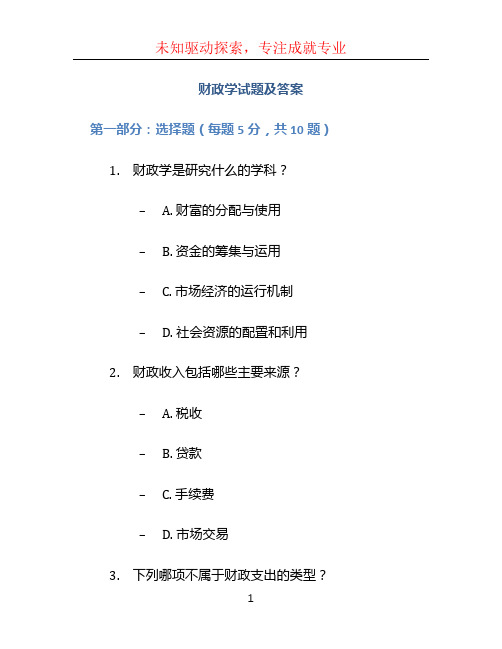
财政学试题及答案第一部分:选择题(每题5分,共10题)1.财政学是研究什么的学科?– A. 财富的分配与使用– B. 资金的筹集与运用– C. 市场经济的运行机制– D. 社会资源的配置和利用2.财政收入包括哪些主要来源?– A. 税收– B. 贷款– C. 手续费– D. 市场交易3.下列哪项不属于财政支出的类型?– A. 教育支出– B. 社会保障支出– C. 国防支出– D. 生产投入支出4.财政平衡的原则是指什么?– A. 收入和支出的平衡– B. 政府债务的减少– C. 收入和支出的调剂– D. 政府的资金储备5.增值税属于什么类型的税收?– A. 直接税– B. 间接税– C. 个人所得税– D. 社会保险费6.财政政策是指政府如何调整什么?– A. 资金的筹集与运用– B. 市场经济的运行机制– C. 资源的配置和利用– D. 收入和支出的平衡7.下列哪个是宏观经济学的一个基本目标?– A. 经济增长– B. 资源配置– C. 宏观稳定– D. 公平与效率的平衡8.货币供应量的增加会导致什么?– A. 通货膨胀– B. 通货紧缩– C. 汇率上升– D. 债务下降9.消费税属于哪种类型的税收?– A. 直接税– B. 间接税– C. 企业所得税– D. 土地使用税10.财政学的基本假设是什么?– A. 个人理性行为假设– B. 社会效用最大化假设– C. 企业利润最大化假设– D. 市场均衡假设第二部分:填空题(每题5分,共10题)1.政府对市场经济起到调节和引导的作用。
2.预算是财政决策的基本工具。
3.政府通过税收的方式筹集财政收入。
4.政府通过公共投资来推动经济增长。
5.收入分配是财政社会政策的重要内容。
6.财政政策通过调整税收和支出来影响经济运行。
7.财政平衡指的是收入和支出保持平衡。
8.所得税是一种直接税。
9.市场经济中,资源的有效配置由价格来决定。
10.宏观经济学关注的是整体经济状况和经济运行规律。
财政学习题(附答案)

现代西方财政学单元练习题第一单元(导言、基础理论部分)单项选择题1、狭义的公共部门是指()。
A、各类公共组织B、各级政府部门及组织C、各种公营企业D、各种公用事业部门2、市场机制在()方面具有较高的效率。
A、公共产品的配置B、私人产品的配置C、收入再分配D、外部效应的纠正3、政府可以干预经济的充分条件是()。
A、市场存在失灵B、政府比私人更成功、更有效C、政府拥有强制力D、政府为公众利益服务4、如果某项经济变动使某些人得到利益而另一些人受到损失,但受益者的所得足以补偿受损者的所失,那么这种社会福利的改进就是()。
A、帕累托改进B、帕累托无效率改进C、帕累托潜在改进D、非帕累托有效改进5、社会资源配置效率有效性检验的标准是()。
A、MSB=MSCB、MB=MCC、TSB-TSC=TNSB>0D、TSB-TSC=TNSB→max6、社会资源配置效率“水平”的总值检验标准是()。
A、MSB=MSCB、MB=MCC、TSB-TSC=TNSB>0D、TSB-TSC=TNSB→max7、市场经济最基本的收入分配准则是()。
A、要素禀赋准则B、按劳分配准则C、按资分配准则D、功利准则8、经济的横向公平是指()。
A、同等经济地位的人差别对待B、同等经济地位的人同等对待C、不同经济地位的人差别对待D、不同经济地位的人同等对待9、经济的纵向公平是指()。
A、同等经济地位的人差别对待B、同等经济地位的人同等对待C、不同经济地位的人差别对待D、不同经济地位的人同等对待10、经济学家用来说明收入分配状况的曲线是()。
A、洛伦茨曲线B、罗尔斯曲线C、奥肯替代线D、拉弗曲线11、从富人向穷人的收入再分配政策会引起总产量的减少,这就是()。
A、再分配限度论B、公平与效率交替论C、市场分配论D、富人狡辩论12、私人产品的市场需求曲线的推导方法是()。
A、个人边际成本曲线的水平加总B、个人边际成本曲线的垂直加总C、个人边际利益曲线的水平加总D、个人边际利益曲线的垂直加总13、公共产品的总需求曲线的推导方法是()。
财政学习题

第一章财政的概念与职能一、单项选择题1. 以下不属于市场失灵表现的是〔〕A.收入分配不公B.防治传染性疾病C.国防科技研究D.企业降低本钱提高竞争力2. 以下不属于造成垄断的原因的是〔〕A. 本钱递减B. 规模报酬递增C. 产品之间的差异D. 行业的厂商很少3. 财政分配的主体是〔〕A. 家庭B. 社会团体与组织C. 政府D. 企业4. 财政分配区别于其他分配畴的根本特征是〔〕A. 财政分配的主体是国家或政府B. 分配的对象是社会产品与效劳C. 目的是满足社会公共需要D. 分配具有历史性5. 财政分配的目的是〔〕A.为了建立社会主义强大国家B.为了合理配置资源,提高经济效益C.为了实现国家政治经济职能D.为了满足社会公共需要6. 以下哪种观点主“财政活动表达的是以国家〔或政府〕为主体的分配关系〞〔〕A.国家分配论B.价值分配论C.国家资金运动论D.社会共同需要论7. 财政是一个,是以国家为主体的分配活动。
A.经济畴B.政治畴C.社会畴D.法律畴8. 运用有限的资源能形成最正确的资产构造、产业构造、技术构造和地区构造,到达优化资源构造的目的,属于财政职能中的〔〕A.收入分配B.资源配置C.物价稳定D.经济稳定和开展9. 当前,各国普遍使用的公平收入分配的指标是〔〕A.恩格尔系数B.收入弹性系数C.基尼系数D.价格指数10. 以下属于财政资源配置功能的是〔〕A.征收个人所得税B.建立社会保障制度C.公共投资D.控制货币供应量11.作为市场人的企业,与其纳税责任相对应的权利是〔〕。
A.产品和效劳定价B.销售产品和效劳收费C.享受政府提供的公共效劳D.自主选择投资12.通货膨胀是属于以下哪项因市场失灵而导致的宏观经济问题〔〕。
A.公共产品供应“搭便车〞B.资源配置失衡C.收入分配不公D.经济波动与失衡13.关于混合经济,以下哪项理解是错误的〔〕。
A.企业和个人提供产品和效劳受市场供求关系影响B.企业和个人提供产品和效劳受政府财税政策影响C.政府提供效劳受市场供求关系影响D.政府提供效劳是公共选择的结果14.关于资源配置效率,以下理解不正确的选项是〔〕。
《财政学》第一章 习题

第一章财政概念和财政职能一、单项选择题1.财政是一种()为主体的经济行为A. 企业B. 个人C. 国家或政府D. 市场2.现代经济是以市场为基础运行的社会再生产过程,因而被称之为()A. 市场过程B. 现代生产C. 市场经济D. 社会经济3.某一个体单位从事其经济活动对其他个体单位产生了有利或不利的影响是指()A. 外部效应B. 外部作用C. 经济作用D. 经济活动4.三元经济系统指:家庭,政府和()A. 要素市场B. 企业C. 商品市场D. 社会5.用来满足社会共同需要的产品和服务称为()A. 公共商品B. 公共物品C. 公共服务D. 社会产品6.收入分配的主体是()A. 社会B. 银行C. 税收D. 政府7.财政分配的主体是()A. 社会B. 国家C. 企业D. 市场8.当资源配置达到了这样的状态:没有一种状态的改变能使一部分人的境况变好而不同时使另一些人处境变坏。
这种状态称为()A. 免费搭车现象B. 边际效用递减C. 市场失灵D. 帕累托最优9.反映了财政学的特点的研究课题是()A. 国民经济中货币与产品之间的关系及其对经济的影响B. 国民经济中各产业部门之间的相互关系及其对经济的影响C. 国民经济中各地区之间的相互关系及其对经济的影响D. 国民经济中公共部门与私人部门之间的相互关系及其对经济的影响10.下述不属于财政学实证分析范畴的问题是()A. 我国税收的累进度应该多大?B. 某项公共支出的主要受益者是哪些群体?C. 降低关税之后我国进出口结构会出现怎样的变化?D. 发行一定规模的国债能在多大程度上拉动经济?11.下述不属于财政学中的规范分析的是()A. 我国公共部门或财政的规模是过大了还是过小了?B. 对电讯行业是否需要政府规定价格?C. 若用消费型增值税取代生产型增值税会使社会的产出结构发生怎样的变化?D. 税收的累进程度多大为宜?12.下列哪种情况实现了帕累托最优?()A. 要使A的处境改善必然会使B的处境恶化。
《财政学》部分习题参考答案

页眉内容《财政学》部分习题参考答案第一章现代国家的经济职能(一)填空题1. 收入分配不公平、经济波动2. 非排他性、非竞争性3. 优化资源配置、公平分配4. 国家或政府、满足社会公共需要5. 价格、产量6. 价格机制、政府的收支活动7. 资源配置、收入分配8. 政府财政配置、第三部门配置9. 市场配置、价格和竞争10. 调整存量结构、调整投资结构11. 经济公平、社会公平12. 实现公平分配13. 基尼系数14. 0.3~0.415. 政府对企业的转移支付、政府间的转移支付(三)单项选择题1.A2.D3.A4.C5.A6.D7.A8.A9.B 10.C(四)多项选择题1.ABCD2.ACD3.ACD4.ABD5.ABC6.ABCD7.CD8.BCD(五)判断题1.对2.错3.错4.对5.对6.错7.错8.错9.错 10.对第二章公共产品理论(一)填空题1.尊重的需要、自我实现的需要2.收益的内在性、需求的分散性3.集中性、强制性4.排他性、竞争性5.非排他性、非竞争性6.每个人愿意承担的成本份额之和等于17.私人部门供给、公司伙伴关系供给8.供给公共产品9.弥补市场失灵10.公共产品供给的效率标准问题11.宏观资源配置效率较优、市场失效12.市场失灵、政府公共产品供给不足13.公共服务社区化、与公共部门建立伙伴关系14.公益推广活动、许可证战略15.公共部门、私人部门16.市场价格机制17.产权界定不明确或界定不当18.交易成本为零19.外部边际收益20.标准必须由政府立法制定,一旦制定后企业和个人一致遵守(三)单向选择题1.C2.A3.B4.D5.C6.A7.B(四)多项选择题1.ACD2.ABC3.ABC4.ABCD5.ABD6.ABCD7.ABCD8.ABCD(五)判断题1.错2.错3.错4.对5.对6.对7.对8.对第三章公共选择与政治过程(一)填空题1. 投票机制2. 单个的个体3. 选民、利益集团;政治家和官僚;“选票”4. 经济市场;政治市场5. 偏好的显示问题;偏好的加总问题6. 偏好显示机会不均等;偏好显示不充分7. 简单多数票规则8. 免费搭车9. 供给缺乏弹性(三)单项选择题1.A2.B3.C4.D(四)多项选择题1.ABC2.ABCD3.ABCD4.ABCDE(五)判断题1.错2.对3.对4.错5.错第四章财政支出一般理论(一)填空题1.社会文教;2.财政支出;3.债务利息支出;4.以财政支出是否与商品和服务相交换;5.收入分配;6.软约束;7.财政支出增长边际倾向;8.政治因素;9.收益率;10.效益;11.皮科克和怀斯曼(三)单项选择题1.A2.B3.D4.A5.B6.A7.D8.D9.D 10.A 11.D (四)多项选择题1.ABD2.ADE3.ABCD4.CE5.ABDE6.AC7.ABCD8.ABCD9.ABD 10.ABD(五)判断题1.错2.对3.错4.错5.对6.错7.对8.错9.错 10.对 11.错 12.对第五章购买性支出(一)填空题1.财政投资性支出2.R&D经费投入3.基础科学研究4.内生增长理论5.公用经费6.维持费7.基础产业8.日本9.农业生产率 10.基础科学研究项目(三)单项选择题1.D2.D3.B4.B5.D6.C7.B8.B9.A 10.D 11.D 12.B13.D 14.A 15.A 16.C(四)多项选择题1.AB2.ABC3.ABC4.ABCD5.ACD6.ABD7.ABE8.ABD9.ABCDE 10.ABC(五)判断题1.对2.错3.对4.对5.错6.错7.对8.错第六章转移性支出(一)填空题1.社会保障制度2.社会保障支出3.社会福利4.现收现付5.政府预算6.企业亏损补贴7.照顾性税收支出8.再投资退税9.德国 10.福利型(三)单项选择题1.B;2.D;3.A;4.A;5.D;6.A;7.B;8.A;9.A;10.A(四)多项选择题1.ABCDE2.ABCDE3.BCDE4.ABCD5.ABC6.AD7.BC8.ABD9.ABCD 10.AB(五)判断题1.对2.错3.对4.对5.对6.对7.错8.错9.对 10.对第七章财政收入一般理论(一)填空题1.税收、 90%、规费2.预算内财政收入、预算外财政收入3.财政收入的绝对量、财政收入的相对量4.第二产业5.国民生产总值中由政府支配的一部分社会产品价值或国民收入中由政府支配的一部分收入6.力役、实物、货币7.税收8.政府信用9.自愿性、有偿性、灵活性10.强制性、无偿性、固定性(三)单项选择题1.A2.B3.B4.C5.C6.D7.D8.C9.A 10.B 11.A 12.A (四)多项选择题1.ABCD2.ABC3.ABDE4.ABCDE5.ABCD6.CD7.ABC8.ABCD9.ACDE 10.ABCD 11.CD 12.ACD(五)判断题1.错2.对3.对4.对5.错6.对7.对8.错9.对 10.对第八章税收基本原理(一)填空题1.政治权利2.商品课税3.在于税收的超额负担是否最小4.横向公平、纵向公平5.19276.顺转7.易,难8.易9.《国富论》10.瓦格纳(三)单项选择题1.B2.B3.B4.B5.B6.B7.A8.D9.B 10.A(四)多项选择题1.ABC2.ABD3.ABC4.ABC5.AB6.ACDE7.ACD8.AC9.ABCDE 10.ABD(五)判断题1错 2错 3对 4对 5错 6对 7错 8错 9对 10错第九章税收制度(一)填空题1.70%以上2.143.零售4.法国5.价6.避免重复征税7.808. 20099.生产10.价(三)单项选择题1.A2.A3.C4.A5.D6.A7.D8.D9.A 10.B(四)多项选择题1.ABCD2.AB3.ABCDE4.ABC5.ABD6.ABCDE7.BCD8.ABC9.ABCD 10.B(五)判断题1.对2.错3.错4.错5.错6.错7.错8.错9.错 10.错第十章非税收入管理(一)填空题1.受益2.准公共产品3.法律4.55.财政部门6.省价格主管部门会同省财政部门7.劳务报偿标准8.15(三)单项选择1.A2.D3.D4.A5.B6.D7.A8.C9.A10.D(四)多项选择1.ABCE2.ABCDE3.AB4.AD5.ABCD6.ABCD7.ABDE8.ABCDE 9.ABCD 10.AB(五)判断题1. 对2.错3.错4. 对5. 对6.错7. 对8.错9.错10.错第十一章政府债务管理(一)填空题1.政府2.国债3.政府信用4.国债5.国家或政府的信用6.政府财政收不抵支7. 昭信股票8.人民胜利折实公债9.601110.政治经济学及赋税原理(三)单项选择1.B2.A3.A4.A5.A6.C7.B8.D9.A10.B(四)多项选择1.ABCE2.AB3.ABC4.ABCD5.ABCD6.ABCDE7.ABCDE8.AB 9.ABC 10.ABCD(五)判断1.错2.对3.错4.对5.错6.错7.错8.对9.对 10.错第十二章政府预算(一)填空题1.英国2.单式预算、复式预算3.复式预算4.执行结果5.中央预算6.单位7.中央、中央8.各级人民代表大会9.199010.2007(三)单项选择1.A2.B3.A4.D5.A6.A7.A8.A9.A 10.A(四)多项选择1.BCDE2.AB3.ABCDE4.ABCDE5.ABC6.AB7.ABCD8.ABCE 9.BCD 10.AB(五)判断1.错2.错3.对4.错5.对6.对7.对8.对9.对 10.对第十三章政府间财政关系(一)填空题1.布坎南2.19563.搭便车4.19945.地方税6.地方税7.地方8.地方9.地方10.地方(三)单项选择题参考答案:1.C2.A3.A4.A5.D6.A7.C8.B9.C 10.C(四)多项选择1.ABC2.ABCD3.D4.BE5.ABC6.ACE7.ABC8.ABCE9.ABCD 10.BCDE(五)判断题1.对2.错3.对4.对5.对6. 对7.错8.对9.对 10.错第十四章财政政策(一)填空题1.中央2.税收、财政支出、公债、财政预算3.存款准备金、再贴现、再贷款4.充分就业、物价稳定、经济增长、国际收支平衡5.滞涨6.增加(三)单项选择题答案:1.A2.A3.A4.D5.A6.D7.D8.B9.A(四)多项选择题1.AB2.ABCD3.AD4.BC5.BD6.ABC7.ABCD8.AC9.BD 10.AC(五)判断题1.对2.错3.对4.错5.错6.对7. 错8.错9.对 10.对。
财政学习题及答案

第一章习题—•、选择题—1.财政的职能主要有()°A.资源配置B.收入分配C.经济稳定D.财政监督2.市场失灵的表现有()°A.公共产品B.外部效应C.信息不充分D.自然垄断3.公共产品与私人产品区别的主要标准是()°A.非排他性B.非竞争性C.不可分割性D.排他性4.财政分配的主体是()A.企业B.国家C.家庭D.社会团体与组织5.财政产生的条件有()°A.社会条件B.文化条件C.经济条件D.历史条件E.政治条件6.属于典型的负外部性的例子是()°A.海上灯塔B.汽车尾气C.企业对资源的配置D.义务教育二、判断题1. 无论是在计划经济还是在市场经济下,财政对资源配置起基础作用。
()2. 现实经济生活中,客观存在着这样一些物品,它们满足我们的共同需要,在同一时间中可使多个个体得益,并无须通过竞争来享用,这些物品被叫做公共产品。
()3. 税负不变是财政稳定经济职能的目标构成要素。
()4. 财政产生的首要条件是政治条件。
()三、名词概念1. 财政2.市场失灵3.外部效应4.公共产品5.资源配置四、问答题1. 市场失灵的原因以及表现。
2. 资源配置职能的含义以及实现该职能的财政手段。
3. 收入分配职能的含义以及实现该职能的财政手段。
4. 经济稳定职能的含义以及实现该职能的财政手段。
第二章习题、选择题1 •政府为履行职能,取得所需商品和劳务而进行的财政资金支付,是()。
A •政府预算B •财政收入C.财政支岀D•财政政策2•当产生()的结果时,是因为购买性支岀增加。
A •劳动力的工资率降低B •社会生产萎缩C •资本的利润率降低D •国民收入增加.与企业生产效益比较,财政支岀效益的特点有 ( )3. 4. 5. 6. 7. 8. 9.101112 1314 15从世界各国的情况看,财政支岀总量及占 A •绝对量增长,相对量也增长 C •绝对量增长,相对量下降 我国现行的社会保险运行模式是 ()<A •全部为社会统筹 C •全部为个人账户财政用于文教科学卫生方面的支岀属于GDP 比重的变化趋势是( )。
财政学题库带答案
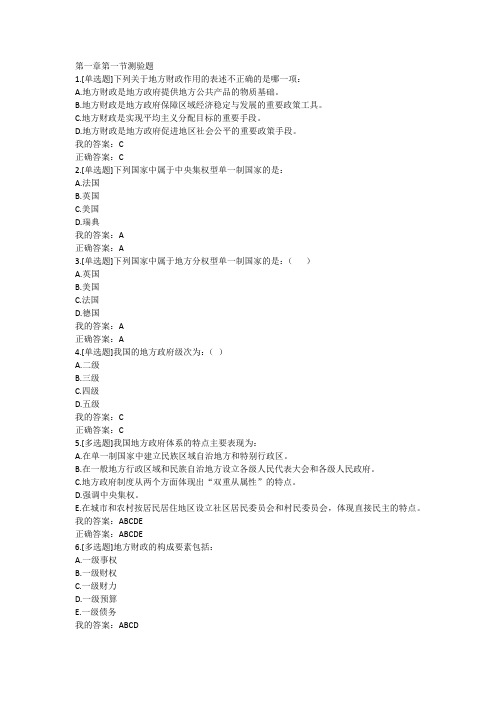
第一章第一节测验题1.[单选题]下列关于地方财政作用的表述不正确的是哪一项:A.地方财政是地方政府提供地方公共产品的物质基础。
B.地方财政是地方政府保障区域经济稳定与发展的重要政策工具。
C.地方财政是实现平均主义分配目标的重要手段。
D.地方财政是地方政府促进地区社会公平的重要政策手段。
我的答案:C正确答案:C2.[单选题]下列国家中属于中央集权型单一制国家的是:A.法国B.英国C.美国D.瑞典我的答案:A正确答案:A3.[单选题]下列国家中属于地方分权型单一制国家的是:()A.英国B.美国C.法国D.德国我的答案:A正确答案:A4.[单选题]我国的地方政府级次为:()A.二级B.三级C.四级D.五级我的答案:C正确答案:C5.[多选题]我国地方政府体系的特点主要表现为:A.在单一制国家中建立民族区域自治地方和特别行政区。
B.在一般地方行政区域和民族自治地方设立各级人民代表大会和各级人民政府。
C.地方政府制度从两个方面体现出“双重从属性”的特点。
D.强调中央集权。
E.在城市和农村按居民居住地区设立社区居民委员会和村民委员会,体现直接民主的特点。
我的答案:ABCDE正确答案:ABCDE6.[多选题]地方财政的构成要素包括:A.一级事权B.一级财权C.一级财力D.一级预算E.一级债务我的答案:ABCD正确答案:ABCD7.[判断题]从大多数国家情况来看,首先产生的是地方政府。
我的答案:错正确答案:错8.[判断题]根据本课程对地方政府的界定,省级政府不属于地方政府。
我的答案:错正确答案:错第一章第二节测验重做(剩余99次)1.[判断题]自改革开放后,尤其是分税制改革后,我国地方财政支出的绝对规模和相对规模都在不断下降。
我的答案:错正确答案:错2.[判断题]从总体上看,我国财政收入的地区差距很大,无论是财政收入总量,还是人均财政收入,东部地区都要高于中部、西部地区。
我的答案:对正确答案:对3.[判断题]我国的地方政府间存在着激烈的财政竞争。
财政学习题及答案

第一章财政概念与财政职能一、名词解释1.市场失灵:市场没有能够发挥高效率配置资源的作用2.外部效应:一个人或者企业的经济活动对他人造成的影响4.公共产品:政府部门提供的用于满足社会公共需要的商品或劳务5.公共需要:社会成员共同的群体需要6.非排他性:一个成员使用社会公共产品的同时不能排除他人使用该公共产品或者排除的成本很高7.非竞争性:增加或减少一个社会成员享用公共产品时并不增加或减少该产品的生产成本8.财政:以国家为主体的分配活动特征:国家主体性强制性无偿性二、不定项选择1.一般来说,下列哪些物品是纯公共物品:A.国防 B.花园C.教育D.桥梁2。
一般来说,下列哪些物品是准公共物品(非竞争性和排他性): A.国防 B.花园C.教育 D.桥梁3.市场的资源配置功能不是万能的,市场失灵主要表现在:A.垄断 B.信息不充分或不对称C.收入分配不公 D.宏观经济波动4.政府干预经济的手段包括:A..立法和行政手段B.组织和生产公共产品C.财政手段(经济手段)D.强制手段5.政府干预失效的原因和表现可能发生在:A.政府决策失误B.政府提供信息不及时甚至失真C.政府职能的“越位”和“缺位”D.寻租行为7.财政的基本职能是:A.资源配置职能B.收入分配职能C.组织生产和销售职能D.经济稳定与发展职能8.公共财政的特征:A.弥补市场失灵B.一视同仁的服务C.非市场盈利性D.法制化财政9.财政实现收入分配职能的机制和手段有:A.划清市场与财政分配的界限和范围B.规范工资制度C.加强税收调节D.通过转移支出和转移性支出三、问答1.政府矫正市场失灵的方法?2.区分公共物品与私人物品的基本标准。
(非竞争性和非排他性)3.财政资源配置职能的概念和内容?概念:通过财政收支活动以及相应的财政政策的制定,可以实现对现有人力、物力、财力等社会资源结构与流向的调整和选择内容:调节资源在各产业部门间的配置调节资源在不同地区间的配置调节资源在政府和非政府部门间的配置4.财政经济稳定与发展职能的含义和主要内容?稳定:价格稳定、充分就业、国际收支平衡发展:产出增长、经济结构优化、文教科卫条件的改善、政治民主化程度的提高主要内容:调节社会总需求,实现供求总量大体平衡调节社会供求结构的平衡非生产性公共需要第二章财政支出基本理论一、术语解释1.公共支出:政府为实现职能和政治经济目标安排支出的总称2.公共生产:所有权归政府的单位和企业3.挤出效应:政府增加某些项目的支出会相应的减少社会成员的有关支出4.分配效应:政府的公共支出可能造成利益的转移表现为利益再分配二、不定项选择1.混合物品的有效提供主要有哪几种方式:A.政府授权经营 B.政府参股C.政府补助 D.政府直接生产3.为了提高公共支出的配制效率,财政部门应该做到:A.财政支出的来源是受严格立法的约束B.财政支出的规模和结构都有制度的严格规定C.公共部门是非盈利性的部门,不以追求利润而以追求社会效益最大化为目标D.财政资金的安排是高度透明的,财政民主不仅是政治民主的一个重要要素,而且是政治民主的集中体现三、问答1、一般来说,纯公共物品只能由政府来提供,请解释其理由。
- 1、下载文档前请自行甄别文档内容的完整性,平台不提供额外的编辑、内容补充、找答案等附加服务。
- 2、"仅部分预览"的文档,不可在线预览部分如存在完整性等问题,可反馈申请退款(可完整预览的文档不适用该条件!)。
- 3、如文档侵犯您的权益,请联系客服反馈,我们会尽快为您处理(人工客服工作时间:9:00-18:30)。
Chapter 1 Problems and Solutions1.The United States Treasury borrows money on behalf of the federal government allthe time. One type of government borrowing, called a Treasury bill, promises afixed payment at some number of months in the future. The Treasury receives less for a promise to make a payment of $100 in six months than it does for a promise to make a payment of $100 in three months. Why? Explain how this arrangement illustrates the core principle that time has value.Answer: Since time has value, a promise to make a payment of $100 three months from now is worth less than $100 today.2.Describe the links between the five components of the financial system and the fivecore principles of money and banking.Answer:a.Money economizes on the need to obtain information. Sellers don’t need to knowwho buyers are.b.Financial instruments promise payment that may or may not be made in the future.Pricing them uses the first two core principles: time has value and risk requirescompensations.c.Financial markets are where financial instruments are bought and sold. They provideinformation, and they set prices. Core principles #3 and #4 come into play.d.Financial institutions collect and process information. They are based on then factthat information is the basis for decisions.e.Central banks are engaged in stabilizing the economy and averting financial crisis;their behavior is based on the core principle that stability improves welfare.3.Socialists argue that, to reduce the power exerted by the owners of capital, the stateshould control the allocation of resources. Thus, in a socialist system, the stateallocates investment resources. In a market-based capitalist system, financialmarkets do that job. Which approach do you think works better, and why? Relate your answer to the core principle that markets set prices and allocate resources.Answer: Markets allocate use the price system to allocate resources to their most efficient uses. Markets aggregate information from a multitude of sources. Command economies do not aggregate information as well, and do not allocate resources as efficiently.4.Most investment advisers tell their clients to purchase shares in one or more mutualfunds rather than to buy individual stocks. They argue that this practice reduces risk.Explain why.Answer: Holding a large number of investments tends to reduce risk since they are unlikely to all go down (or up) at the same time.5.Small businesses tend to borrow money from banks. Would you lend directly to asmall business? Relate your answer to the third core principle of money andbanking, that information is the basis for decisions.Answer: It would not be very prudent for you to make a loan to a small business. This is true for two reasons. First, you have a difficult time evaluating the borrower’s creditworthiness; and second, it will be very costly for you to monitor what they do with the funds.6.Financial innovation has reduced individuals’ need to carry cash. Explain how. Answer: Everyone has a number of alternative methods of payment. Electronic forms, like credit and debit cards, are the primary ones that have reduced need to carry cash.7.For many years, people got their mortgages at local banks. Today, prospectivehomeowners can get a mortgage through a broker who obtains funds from institutions all over the country. What effect do you think this financial innovation has had on an individual’s ability to obtain a mortgage? What effect do you think it has had on interest rates and mortgage fees?Answer: Mortgages have become more available and cheaper (both in terms of fees and interest rates). Increased competition has been good for borrowers. One of the primary reasons for this is that funds now flow easily between geographic regions. Banks used to be local, taking deposits and making loans in their communities. If the bank had no funds to loan, a potential borrower was out of luck. Innovation has changed all that.8.Suppose central bankers have figured out a way to eliminate recessions. Whatfinancial and economic changes would you expect to see? Relate them to the core principle that stability improves welfare.Answer: If recession were completely eliminated, then everyone’s income would be stabilized and the returns to business investment would become more predictable. This would reduce risk and allow people to do things that they otherwise would not do. One possibility is the economy would grow more quickly.9.What is it important that financial markets offer individuals the ability to buy and sellfinancial instruments quickly and cheaply?Answer: Without the ability to buy and sell stocks, bonds, and other financial instruments no one would want to hold them. Who would buy something they couldn’t sell? So ease and low cost are essential for financial markets to work. And without thosemarkets, no one would issue the financial instruments. The financial system would grind to a halt.10.When you apply for a loan, you must answer a lot of questions. Why? Why is theset of questions you must answer standardized?Answer: The questions are aimed at figuring out how likely you are to repay the loan. They are standardized to reduce the cost of making the loan.11.What factors determine the premiums individuals pay for automobile insurance?Why would differences in those factors affect the amount of the premiums? Relate your answer to the core principle that risk requires compensation.Answer: The premium paid for auto insurance is determined by the likelihood of having an accident and making a claim. The more likely someone is to have an accident, the higher the premium. The higher the risk, the bigger the payment to the company has to be.12.Try to list the financial transactions you have engaged in over the past week. Howmight each one have been carried out 50 years ago?Answer: Commercial purchases that you made likely used credit cards and debit cards.50 years ago they would have all used cash. Payment of utilities (if you do it) might have been done by electronic transfer, rather than a check (which would have been the method 50 years ago).13.Would you expect a college loan to have a higher or lower interest rate than a homemortgage? Why or why not? In your answer be sure to use one of the coreprinciples of money and banking.Answer: To get a home mortgage, a borrower must promise the lender the house if they fail to make the payments. This provides a guarantee to the borrower. Without any guarantee, we expect the loan interest rate to be higher to reflect the added risk. College loans that have no guarantee would likely be much too risky for any lender to make (or they would have such a high interest rate than no student would be able to pay). But if there is a guarantee – the student’s parents or the government guarantees most loans – then the interest rate will fall. If you look, what you will see is interest rates that are roughly equal between mortgages and college loans because the guarantees (and risk) are equivalent.14.Merchants that accept Visa or MasterCard pay the issuer of the card a percentage ofthe transaction. For example, for each $100 charged on Visa cards, a merchantmight receive only $98. Explain both why Visa charges the fee and why themerchant pays it. (You should be able to use at least two core principles in your answer.)Answer: The merchant pays Visa for two things. First they are paid immediately, and time has value. Second, Visa takes the risk that the buyer will not pay, and risk requires compensation.15.The government is heavily involved in the financial system. Explain why. Answer: For markets to work there have to be rules. And the rules need to be enforced. The government both makes the rules and enforces them so that we all trust the markets to work as they should. Without the government to monitor the financial system, ensuring that people behave themselves, the system would collapse.。
